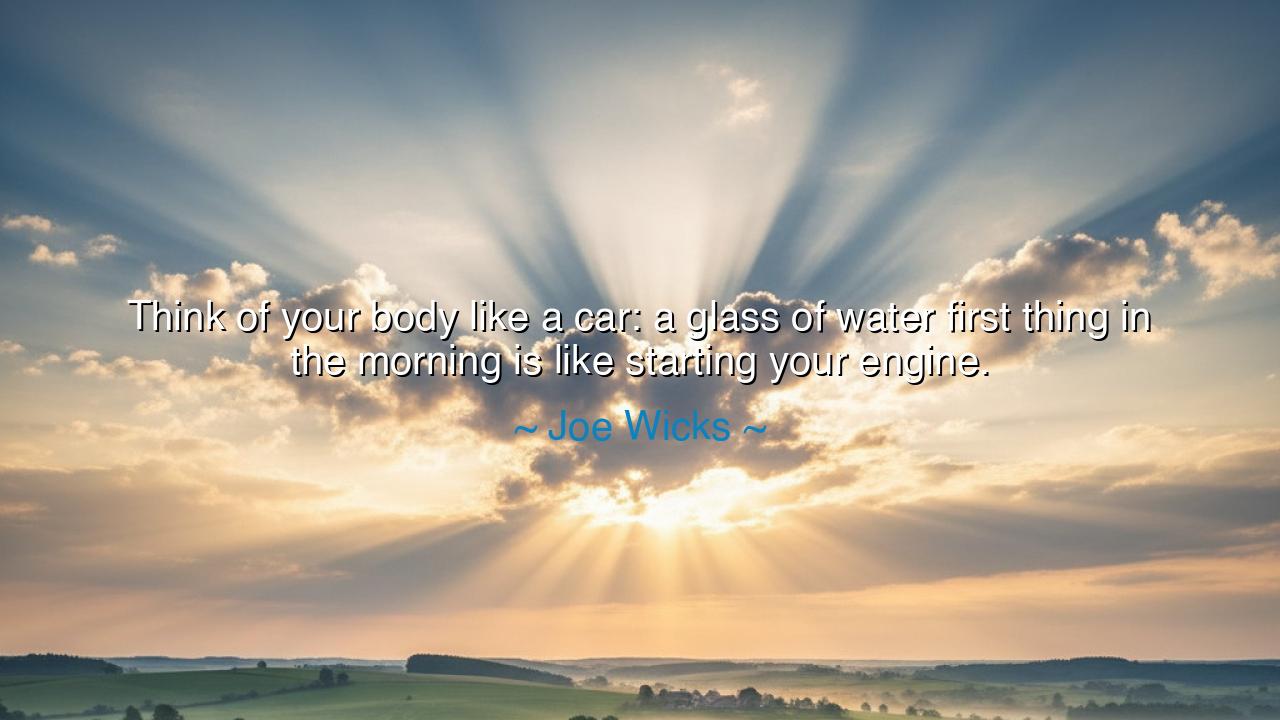
Think of your body like a car: a glass of water first thing in
Think of your body like a car: a glass of water first thing in the morning is like starting your engine.






"Think of your body like a car: a glass of water first thing in the morning is like starting your engine." With these words, Joe Wicks gives us a profound metaphor that connects the health of our body to the care we give a mechanical engine. In a world that often prioritizes quick fixes and short-term gains, Wicks offers a simple yet powerful reminder: our bodies, like machines, need maintenance and nourishment to function at their best. Just as a car requires fuel to run smoothly, so too does our body require water to begin the day with vitality and strength. This metaphor extends to the larger truth that healthy habits form the foundation for sustained well-being.
In the ancient world, the connection between the body and mind was understood as sacred. The Greeks, especially philosophers like Hippocrates, emphasized the importance of maintaining a healthy body as the key to a flourishing life. Hippocrates, often called the father of medicine, taught that "let food be thy medicine," recognizing that proper nourishment is the first step to a healthy life. The Greeks understood that balance between the physical and the spiritual was essential, and that health must be tended to with care and discipline, much like cultivating the soil for a fruitful harvest. Wicks’ metaphor echoes this ancient wisdom: if we start our day with the right fuel—like water—our body will function at its optimal state, just as a well-maintained engine powers a vehicle.
Consider the Roman soldiers, who were taught to follow strict regimens of exercise and nutrition to ensure they remained in peak physical condition. Their discipline was not only to sharpen their skills in battle but to ensure their bodies were always ready for the demands of their work. In battle, a soldier’s body was like the engine of their success—strong, resilient, and prepared. Their daily routines included the careful consumption of food and water to keep their bodies sharp and vigorous, ensuring that their energy was never depleted. The connection between hydration and strength was as critical to them as it is to us in the modern world. Wicks' comparison of a body to a car engine is rooted in this ancient principle—self-care and preparation are what fuel us toward success.
In more recent history, athletes like Usain Bolt, the Olympic sprinter, have often spoken about the importance of daily routines and preparation in reaching their peak potential. Bolt is known not only for his rigorous physical training but also for the simple yet essential habits he incorporates into his life, such as hydrating well before a race. His focus on the basics—ensuring his body is properly fueled with water and nutrition—is not unlike the care one might give to a finely tuned engine. Just as a race car requires proper fueling before every race, an athlete’s body needs to be hydrated and nourished to function at its highest level.
Wicks’ advice to start the day with a glass of water emphasizes the importance of beginning our day with care. Hydration is the first step in the ritual of self-care, setting the tone for the rest of the day. Just as we wouldn’t drive a car without checking the oil or fueling it first, we should not begin our day without attending to our body’s basic needs. A glass of water in the morning is a simple yet powerful action, one that awakens the body and prepares it for the challenges ahead. This small habit helps optimize our performance, not just physically, but mentally and emotionally as well.
The lesson in Wicks’ metaphor is clear: daily rituals of self-care lay the foundation for a life of vitality and success. Much like an engine that requires constant care to run smoothly, our bodies require the nourishment and attention that come from mindful habits. Whether it is hydration, nutrition, or movement, taking the time to care for ourselves each day allows us to function at our best and face the demands of life with energy and clarity. Just as a car needs fuel, we too need fuel—not only in the form of food and water, but also in the form of love, balance, and nurturing care.
Let us take this wisdom into our own lives. Just as the Greeks, Romans, and modern athletes have demonstrated the power of daily discipline and care, so too can we create rituals that honor our own well-being. Begin each day with the simple act of hydrating, and allow that act to remind you that small choices, when made with care, shape the future of your health and happiness. The engine of your body needs your attention—fuel it, care for it, and watch how it runs, not only for the day ahead but for the years to come.






AAdministratorAdministrator
Welcome, honored guests. Please leave a comment, we will respond soon